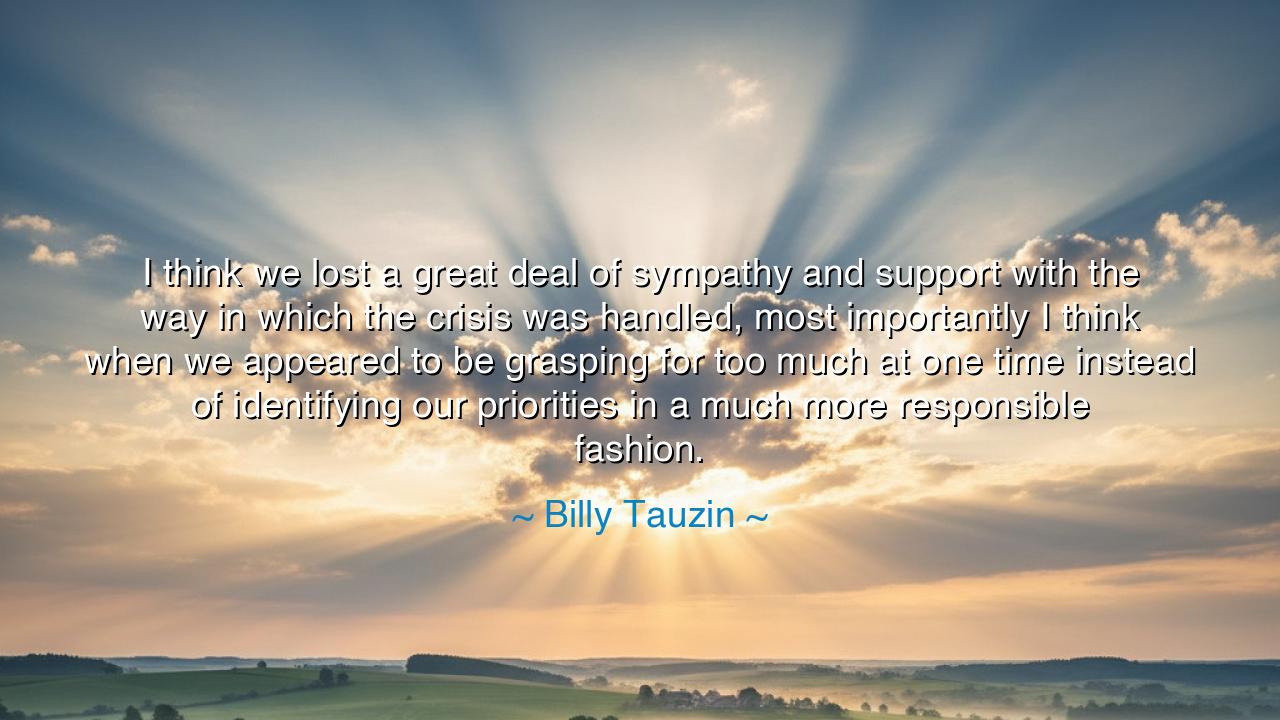
I think we lost a great deal of sympathy and support with the
I think we lost a great deal of sympathy and support with the way in which the crisis was handled, most importantly I think when we appeared to be grasping for too much at one time instead of identifying our priorities in a much more responsible fashion.






Hear now the words of Billy Tauzin, spoken in the wake of storms and trials: “I think we lost a great deal of sympathy and support with the way in which the crisis was handled, most importantly I think when we appeared to be grasping for too much at one time instead of identifying our priorities in a much more responsible fashion.” This is not the idle complaint of a bystander, but the lament of one who saw with clear eyes how the confidence of the people may be squandered when leaders stretch their hands too far, too fast, in the hour of peril. It is a lesson written not in ink alone, but in the blood and trust of nations.
The meaning of these words is plain, yet profound. In times of crisis, men look for steadiness, not frenzy; they long for leaders who will move with responsibility, not with reckless haste. To “grasp for too much at one time” is to reveal the weakness of ambition that outruns wisdom, the folly of a hand that seeks to clutch the whole sky, yet loses the jewel in its palm. Such haste breeds mistrust, for people perceive not strength but desperation, and sympathy—once freely given—slips away like water poured on desert sand.
Reflect upon the tale of the Roman Empire, when in its latter days it stretched its dominion too far, chasing every frontier at once. The emperors sought to hold the British Isles, the Rhine, the Danube, the deserts of the East—all at the same time. Their armies were scattered, their coffers bled dry, their people wearied. Instead of identifying their priorities, they grasped for too much, and in so doing, lost both sympathy and support from their own citizens. The once-mighty Rome, unshaken by centuries of foes, fell not only by the sword of the barbarian, but by the folly of leaders who did not govern with responsible fashion.
Yet wisdom shines not only in failure, but in the examples of triumph. Recall Winston Churchill, standing amid the ruins of London during the Blitz. He did not promise all things at once, nor did he overreach with lofty pledges that could not be met. Instead, he gave his people one clear priority: to survive, to endure, and to resist. His words—“blood, toil, tears, and sweat”—were no grasping for a thousand visions, but a single, steady call to perseverance. And because he did not scatter his aims, he gathered the sympathy and support of a nation, and even of the world.
Thus, the wisdom of Tauzin’s words is confirmed: in crisis, men must not scatter their strength. They must not let their hearts and hands chase every prize. Rather, they must discern what is needful, set their priorities firmly, and act with patient responsibility. For when leaders appear frantic, trust is lost; but when they appear resolute and measured, even in hardship, loyalty and respect abound.
What lesson, then, shall we draw? That in our own lives, whether in family strife, in labor, or in the battle with our own doubts, we too must learn not to grasp for too much at one time. To chase all dreams at once is to betray them all; to neglect the setting of clear priorities is to court defeat. The wise man first secures his foundation before raising the tower; the prudent traveler chooses his path before he spends his strength.
Let each who hears these words take practical action: in every storm of life, pause and discern. Ask: What is the one thing needful? What is the true priority? Then set your heart to that with all discipline and courage. By narrowing your aim, you shall strike true; by steadying your hand, you shall win support; by choosing the essential, you shall triumph over chaos.
So let it be written in your hearts: the measure of strength is not in the fever of grasping, but in the calm of wise responsibility. For sympathy follows clarity, support follows focus, and the favor of men and of heaven rests upon those who know what matters most.






AAdministratorAdministrator
Welcome, honored guests. Please leave a comment, we will respond soon